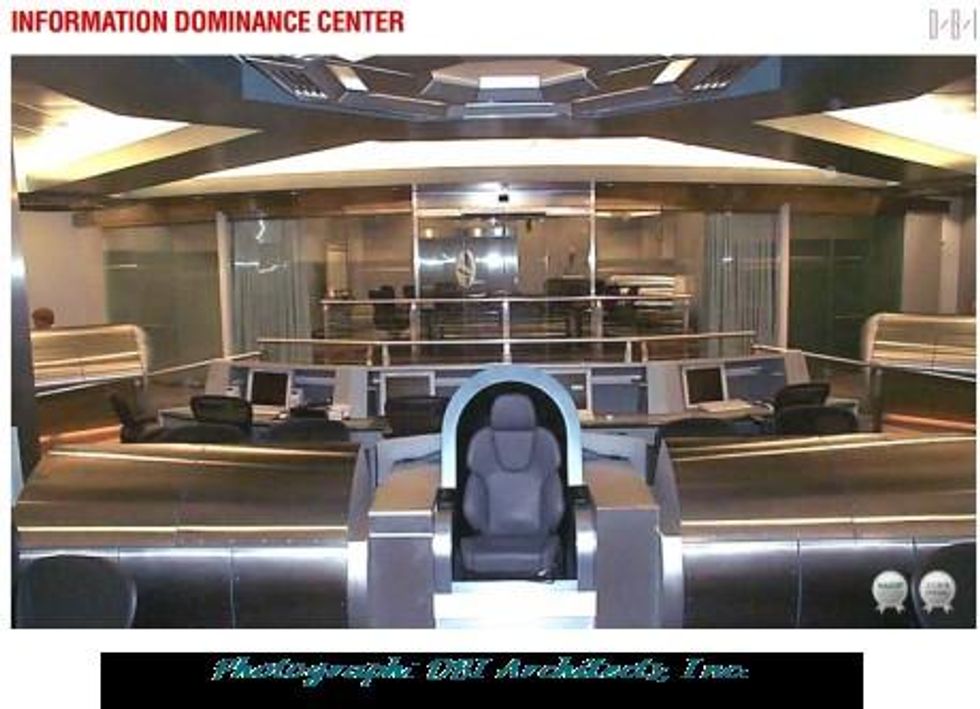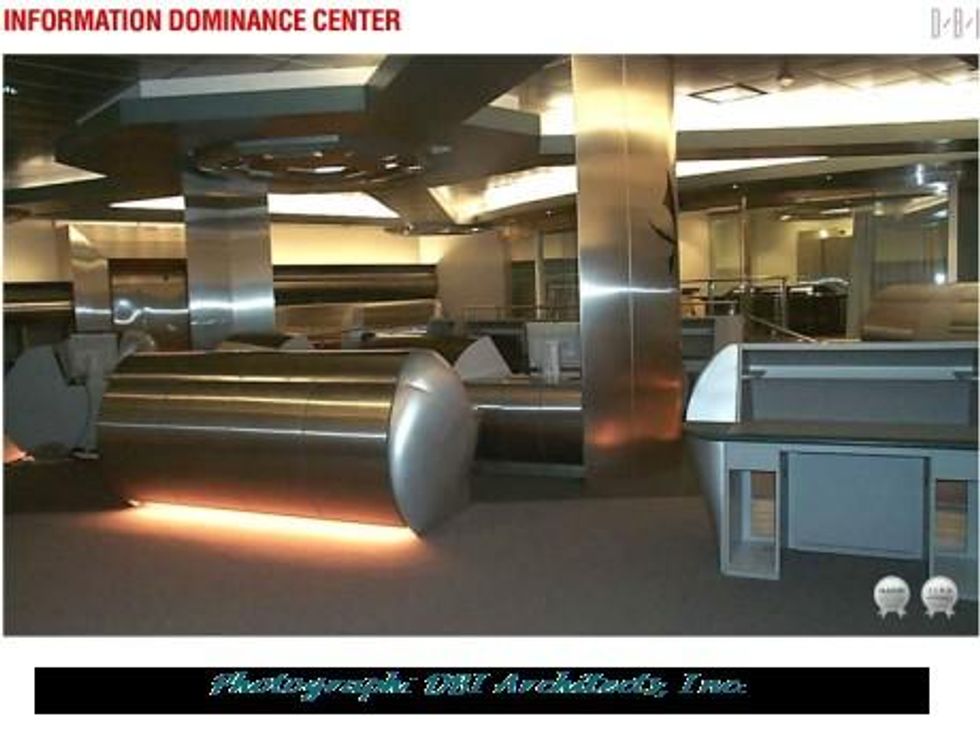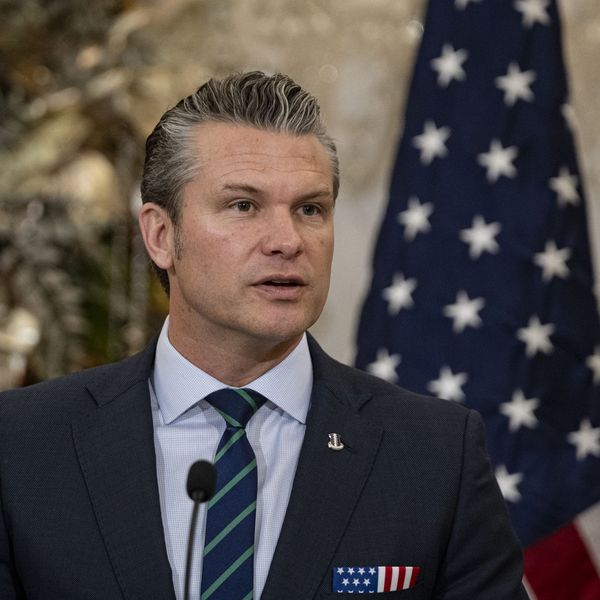Inside the Mind of NSA Chief Gen. Keith Alexander
A lavish Star Trek room he had built as part of his "Information Dominance Center" is endlessly revealing
It has been previously reported that the mentality of NSA chief Gen. Keith Alexander is captured by his motto "Collect it All". It's a get-everything approach he pioneered first when aimed at an enemy population in the middle of a war zone in Iraq, and has now imported onto US soil, aimed at the domestic population and everyone else.
But a perhaps even more disturbing and revealing vignette into the spy chief's mind comes from a new Foreign Policy article describing what the journal calls his "all-out, barely-legal drive to build the ultimate spy machine". The article describes how even his NSA peers see him as a "cowboy" willing to play fast and loose with legal limits in order to construct a system of ubiquitous surveillance. But the personality driving all of this - not just Alexander's but much of Washington's - is perhaps best captured by this one passage, highlighted by PBS' News Hour in a post entitled: "NSA director modeled war room after Star Trek's Enterprise". The room was christened as part of the "Information Dominance Center":
"When he was running the Army's Intelligence and Security Command, Alexander brought many of his future allies down to Fort Belvoir for a tour of his base of operations, a facility known as the Information Dominance Center. It had been designed by a Hollywood set designer to mimic the bridge of the starship Enterprise from Star Trek, complete with chrome panels, computer stations, a huge TV monitor on the forward wall, and doors that made a 'whoosh' sound when they slid open and closed. Lawmakers and other important officials took turns sitting in a leather 'captain's chair' in the center of the room and watched as Alexander, a lover of science-fiction movies, showed off his data tools on the big screen.
"'Everybody wanted to sit in the chair at least once to pretend he was Jean-Luc Picard,' says a retired officer in charge of VIP visits."
Numerous commentators remarked yesterday on the meaning of all that (note, too, how "Total Information Awareness" was a major scandal in the Bush years, but "Information Dominance Center" - along with things like "Boundless Informant" - are treated as benign or even noble programs in the age of Obama).
But now, on the website of DBI Architects, Inc. of Washington and Reston, Virginia, there are what purports to be photographs of the actual Star-Trek-like headquarters commissioned by Gen. Alexander that so impressed his Congressional overseers. It's a 10,740 square foot labyrinth in Fort Belvoir, Virginia. The brochure touts how "the prominently positioned chair provides the commanding officer an uninterrupted field of vision to a 22'-0" wide projection screen":

The glossy display further describes how "this project involved the renovation of standard office space into a highly classified, ultramodern operations center." Its "primary function is to enable 24-hour worldwide visualization, planning, and execution of coordinated information operations for the US Army and other federal agencies." It gushes: "The futuristic, yet distinctly military, setting is further reinforced by the Commander's console, which gives the illusion that one has boarded a star ship":

Other photographs of Gen. Alexander's personal Star Trek Captain fantasy come-to-life (courtesy of public funds) are here. Any casual review of human history proves how deeply irrational it is to believe that powerful factions can be trusted to exercise vast surveillance power with little accountability or transparency. But the more they proudly flaunt their warped imperial hubris, the more irrational it becomes.
An Urgent Message From Our Co-Founder
Dear Common Dreams reader, The U.S. is on a fast track to authoritarianism like nothing I've ever seen. Meanwhile, corporate news outlets are utterly capitulating to Trump, twisting their coverage to avoid drawing his ire while lining up to stuff cash in his pockets. That's why I believe that Common Dreams is doing the best and most consequential reporting that we've ever done. Our small but mighty team is a progressive reporting powerhouse, covering the news every day that the corporate media never will. Our mission has always been simple: To inform. To inspire. And to ignite change for the common good. Now here's the key piece that I want all our readers to understand: None of this would be possible without your financial support. That's not just some fundraising cliche. It's the absolute and literal truth. We don't accept corporate advertising and never will. We don't have a paywall because we don't think people should be blocked from critical news based on their ability to pay. Everything we do is funded by the donations of readers like you. Will you donate now to help power the nonprofit, independent reporting of Common Dreams? Thank you for being a vital member of our community. Together, we can keep independent journalism alive when it’s needed most. - Craig Brown, Co-founder |
It has been previously reported that the mentality of NSA chief Gen. Keith Alexander is captured by his motto "Collect it All". It's a get-everything approach he pioneered first when aimed at an enemy population in the middle of a war zone in Iraq, and has now imported onto US soil, aimed at the domestic population and everyone else.
But a perhaps even more disturbing and revealing vignette into the spy chief's mind comes from a new Foreign Policy article describing what the journal calls his "all-out, barely-legal drive to build the ultimate spy machine". The article describes how even his NSA peers see him as a "cowboy" willing to play fast and loose with legal limits in order to construct a system of ubiquitous surveillance. But the personality driving all of this - not just Alexander's but much of Washington's - is perhaps best captured by this one passage, highlighted by PBS' News Hour in a post entitled: "NSA director modeled war room after Star Trek's Enterprise". The room was christened as part of the "Information Dominance Center":
"When he was running the Army's Intelligence and Security Command, Alexander brought many of his future allies down to Fort Belvoir for a tour of his base of operations, a facility known as the Information Dominance Center. It had been designed by a Hollywood set designer to mimic the bridge of the starship Enterprise from Star Trek, complete with chrome panels, computer stations, a huge TV monitor on the forward wall, and doors that made a 'whoosh' sound when they slid open and closed. Lawmakers and other important officials took turns sitting in a leather 'captain's chair' in the center of the room and watched as Alexander, a lover of science-fiction movies, showed off his data tools on the big screen.
"'Everybody wanted to sit in the chair at least once to pretend he was Jean-Luc Picard,' says a retired officer in charge of VIP visits."
Numerous commentators remarked yesterday on the meaning of all that (note, too, how "Total Information Awareness" was a major scandal in the Bush years, but "Information Dominance Center" - along with things like "Boundless Informant" - are treated as benign or even noble programs in the age of Obama).
But now, on the website of DBI Architects, Inc. of Washington and Reston, Virginia, there are what purports to be photographs of the actual Star-Trek-like headquarters commissioned by Gen. Alexander that so impressed his Congressional overseers. It's a 10,740 square foot labyrinth in Fort Belvoir, Virginia. The brochure touts how "the prominently positioned chair provides the commanding officer an uninterrupted field of vision to a 22'-0" wide projection screen":

The glossy display further describes how "this project involved the renovation of standard office space into a highly classified, ultramodern operations center." Its "primary function is to enable 24-hour worldwide visualization, planning, and execution of coordinated information operations for the US Army and other federal agencies." It gushes: "The futuristic, yet distinctly military, setting is further reinforced by the Commander's console, which gives the illusion that one has boarded a star ship":

Other photographs of Gen. Alexander's personal Star Trek Captain fantasy come-to-life (courtesy of public funds) are here. Any casual review of human history proves how deeply irrational it is to believe that powerful factions can be trusted to exercise vast surveillance power with little accountability or transparency. But the more they proudly flaunt their warped imperial hubris, the more irrational it becomes.
It has been previously reported that the mentality of NSA chief Gen. Keith Alexander is captured by his motto "Collect it All". It's a get-everything approach he pioneered first when aimed at an enemy population in the middle of a war zone in Iraq, and has now imported onto US soil, aimed at the domestic population and everyone else.
But a perhaps even more disturbing and revealing vignette into the spy chief's mind comes from a new Foreign Policy article describing what the journal calls his "all-out, barely-legal drive to build the ultimate spy machine". The article describes how even his NSA peers see him as a "cowboy" willing to play fast and loose with legal limits in order to construct a system of ubiquitous surveillance. But the personality driving all of this - not just Alexander's but much of Washington's - is perhaps best captured by this one passage, highlighted by PBS' News Hour in a post entitled: "NSA director modeled war room after Star Trek's Enterprise". The room was christened as part of the "Information Dominance Center":
"When he was running the Army's Intelligence and Security Command, Alexander brought many of his future allies down to Fort Belvoir for a tour of his base of operations, a facility known as the Information Dominance Center. It had been designed by a Hollywood set designer to mimic the bridge of the starship Enterprise from Star Trek, complete with chrome panels, computer stations, a huge TV monitor on the forward wall, and doors that made a 'whoosh' sound when they slid open and closed. Lawmakers and other important officials took turns sitting in a leather 'captain's chair' in the center of the room and watched as Alexander, a lover of science-fiction movies, showed off his data tools on the big screen.
"'Everybody wanted to sit in the chair at least once to pretend he was Jean-Luc Picard,' says a retired officer in charge of VIP visits."
Numerous commentators remarked yesterday on the meaning of all that (note, too, how "Total Information Awareness" was a major scandal in the Bush years, but "Information Dominance Center" - along with things like "Boundless Informant" - are treated as benign or even noble programs in the age of Obama).
But now, on the website of DBI Architects, Inc. of Washington and Reston, Virginia, there are what purports to be photographs of the actual Star-Trek-like headquarters commissioned by Gen. Alexander that so impressed his Congressional overseers. It's a 10,740 square foot labyrinth in Fort Belvoir, Virginia. The brochure touts how "the prominently positioned chair provides the commanding officer an uninterrupted field of vision to a 22'-0" wide projection screen":

The glossy display further describes how "this project involved the renovation of standard office space into a highly classified, ultramodern operations center." Its "primary function is to enable 24-hour worldwide visualization, planning, and execution of coordinated information operations for the US Army and other federal agencies." It gushes: "The futuristic, yet distinctly military, setting is further reinforced by the Commander's console, which gives the illusion that one has boarded a star ship":

Other photographs of Gen. Alexander's personal Star Trek Captain fantasy come-to-life (courtesy of public funds) are here. Any casual review of human history proves how deeply irrational it is to believe that powerful factions can be trusted to exercise vast surveillance power with little accountability or transparency. But the more they proudly flaunt their warped imperial hubris, the more irrational it becomes.

